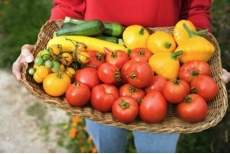
Rural romanticism and “natural” foods
By Ronald L. Doering
Business Operations Food Safety Food Trends Health & Wellness GMOs naturalRonald Doering takes a hard look at what consumers want, what farmers can deliver and how the CFIA is to regulate it all
The proliferation on our grocery shelves of foods with “natural” claims shows no sign of abating. With the growing recognition that organic food is not any safer, tastier, more nutritious or more sustainable, in spite of the higher price, consumers now want foods that are produced the old fashioned way on the small family farm. That’s because consumers think that these foods are free of chemicals and more “natural,” whatever that means.
Not surprisingly, food companies are turning themselves inside out to try to meet this demand. So we see ads with handsome farm families beside their green fields, no doubt providing natural, no-additive, chemical-free, home-style, no-preservative, artisanal “real” food.
I grew up on a farm and it bears little relationship to the bucolic scenes I see in these ads. Farming has always been, and still is, messy, bloody, dirty and very hard work. Why should farmers eschew modern methods to lessen their physical labour and be more efficient just so they meet some urbanite’s notion of what farming should be like? In what other sector of our economy do we encourage the greater use of yesterday’s technology?
I recently heard a sociology professor — exuding a righteous sense of moral superiority — bemoan the increased use of genetically engineered seeds, implying that farmers are helpless rubes who have been taken in by Monsanto’s propaganda. The fact is that farmers are shrewd businesspeople who switched to genetically engineered soybeans, for example, because of the savings in fuel and herbicides and the environmental benefits of no-till seeding.
Rural romanticism is compounded by consumer scientific illiteracy. People tell me they want foods that are completely free of chemicals. Presumably they mean that they want food with no synthetic or man-made chemicals. But a chemical’s properties are determined by its molecular structure and composition, and it’s completely irrelevant whether it was made in a lab by a food scientist or in a plant by Mother Nature.
Contrary to the organic myth, about 99.9 per cent of the chemicals humans ingest each day are natural and mostly untested as possible carcinogens. The amount of synthetic pesticide residues in food are insignificant compared to the natural pesticides that are always in our diet because of the plants we eat. There are dozens of natural chemicals that are known rodent carcinogens in that cup of coffee you had this morning. But before any chemical can be added to food, it  must undergo a rigorous health hazard assessment by Health Canada scientists. The safest and most studied of the 50 million known chemicals are those listed as approved food additives in Division 16 of the Food and Drugs Regulations.
must undergo a rigorous health hazard assessment by Health Canada scientists. The safest and most studied of the 50 million known chemicals are those listed as approved food additives in Division 16 of the Food and Drugs Regulations.
There is much talk these days that consumers are now more knowledgeable and care more about where their food comes from. In my experience, urban Canadians know almost nothing about where their food comes from, and the more they read the less they know. That’s because there is so much misinformation provided by alternative medicine and natural health websites, and by “wellness” magazines that flood into this country every day, all unregulated. They read books written by urban foodies that have never set foot on a farm and who are shocked to learn when they do that most organic food now comes from large “industrial” farms owned by multinationals, the very entities they despise.
The Canadian Food Inspection Agency has tried to regulate the use of natural claims with the warning in section 4.7 of the Guide to Food Labelling, but the guidance is still vague and ambiguity still reigns. Faced with scientifically illiterate consumers suffering from chemical paranoia and rural romanticism, how can a regulator even begin to enforce a prohibition against advertising that is “likely to create an erroneous impression?”
Ronald L. Doering, BA, LL.B., MA, LL.D., is a past president of the Canadian Food Inspection Agency. He practices food law in the Ottawa offices of Gowling Lafleur Henderson, LLP. Contact him at Ronald.doering@gowlings.com
Print this page